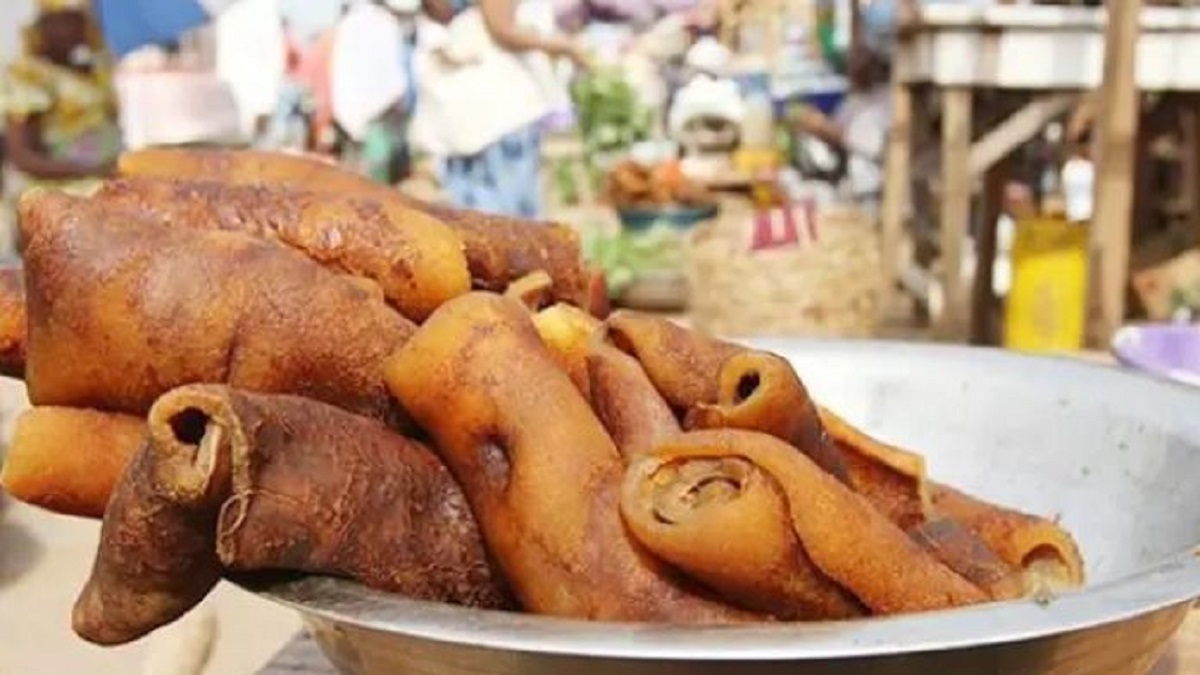Ponmo, also known as cow skin, is a popular delicacy and snack in Nigeria that many people say they cannot do without. It has a soft and delicious texture that makes it a perfect addition to many Nigerian dishes like egusi, efo riro, ogbono and so on. The peppered ponmo snack is also enjoyed with drinks by many Nigerians.
Ponmo is derived from cowhide and it is processed by boiling, scraping, smoking and drying the skin. Although it has little to no nutritional value, many people still prefer it to fish or meat because of its taste and affordability.
Ponmo also serves other purposes, especially in the production of leather. In South Africa, the Nguni people use it for making shields. However, in Nigeria, ponmo is first and foremost considered food before anything else.
Madam Regina, a local food seller in Ogba area of Lagos, told us how her customers always request for ponmo more than fish or meat because it is cheaper and more satisfying.
“The reason is that it is not too expensive. People who have N200 or N300 cannot buy meat, but they can buy ponmo for N50 or N100,” she said.
A carpenter, Mr Olu Teslim, said he prefers ponmo because it is closer to meat and more affordable than meat.
“Ponmo is closer to you taking meat and it is more affordable than meat. The quantity is more than meat, the size is also bigger compared to meat,” he said.
Another customer, Mr Olabode Moses, said he likes ponmo because it is bigger than beef and good for the body.
“Ponmo is bigger than beef because it has body. If I have money now, I will still buy ponmo because ponmo is good for the body,” he said while biting a portion of the ponmo that sits on his bowl of rice.
A female canteen owner, Mrs Nkechi Eze, said though ponmo is loved by many Nigerians, it is important to consume it in moderation and to be aware of the potential health risks associated with its consumption.
“Ponmo is often processed using chemicals such as formalin, which is used to preserve the skin and prevent spoilage. Formalin is a known carcinogen and can be harmful to human health if consumed in large quantities. Also, there is a risk of bacterial contamination when consuming ponmo, as it is often handled and prepared in unsanitary conditions,” she said.
School teacher, Isaiah Caroline, who resides in Iju-Ishaga area of Lagos State, said ponmo is a preferred option to cook meals in these ‘trying times’ when the prices of goods have skyrocketed a great deal.
“I eat ponmo a lot. It is very tasty and cheaper. To prepare a pot of soup, one will need beef worth at least N3,000, added to the cost of other ingredients. But with N1,000 worth of ponmo, in addition to other ingredients, a decent pot of soup can be prepared for a family. Times are hard now and people are trying to adjust.
“Though they say ponmo is harmful. I parboil and discard the water used to parboil it before making my meals with it. That is a safer method of consumption,” she said.
Badagry-based entrepreneur James Segbenu stated that since he discovered the harmful process through which ponmo is made, he had stopped consuming it.
“I don’t like it. It smells bad and it is also harmful to the body. If I have to eat it, I’d opt for the white ponmo.
“I heard it’s processed using used tyres and fuel, which, in my opinion, is harmful to the environment and to one’s health too,” he said.
Though he admitted to eating ponmo occasionally when he eats outside his home, businessman Obinna Ohanuba stated that he never buys ponmo to add to his meals.
“When it is added to the food I buy in the market, I eat it. But I never buy it to cook at home.
“The odour is offensive and I heard that some of them are preserved with chemicals. Some even soak it for one week without bothering to change the water,” he said.
History of Ponmo
Ponmo has been a part of Nigerian cuisine for centuries. It is believed to have originated in the northern part of the country, where it was used as a way to preserve meat. Ponmo was later introduced to other parts of Nigeria, and it quickly became a popular dish.
Nutritional Value of Ponmo
Ponmo is not a very nutritious food. It is low in calories and fat, but it is also low in protein and other essential nutrients. Some people believe that ponmo can be a good source of collagen, but the amount of collagen in ponmo is actually very small.
Health Risks of Ponmo
The production of ponmo has been linked to some health concerns. Ponmo is often processed using chemicals, such as formalin, to preserve it. Formalin is a known carcinogen, and it can be harmful to human health if consumed in large quantities.
In addition, ponmo is often handled and prepared in unsanitary conditions. This can increase the risk of bacterial contamination, which can lead to food poisoning.
Different Types of Ponmo
There are two main types of ponmo: brown ponmo and white ponmo. Brown ponmo is made from the skin of female cows, while white ponmo is made from the skin of male cows. Brown ponmo is typically harder than white ponmo, but it is also more flavorful.
How to Choose the Safest Ponmo
If you are considering eating ponmo, it is important to choose the safest option. The safest ponmo is white ponmo that has been processed without chemicals. You should also avoid ponmo that has been handled or prepared in unsanitary conditions.
Conclusion
Ponmo is a popular Nigerian delicacy, but it is important to be aware of the potential health risks associated with its consumption. If you choose to eat ponmo, it is important to choose the safest option.
